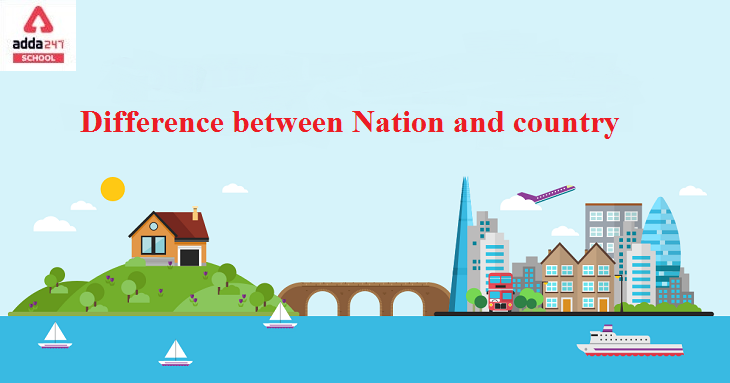Nation and Country Difference
Difference between Nation and Country check here all points. The terms “country” and “nation” are frequently confused, leading to the misconception that they are two different words with the same meaning. However, there are significant disparities between the two.
A country is a unique political and territorial entity. It’s also known as a person’s birthplace, home, or citizenship country.
A country can be a sovereign state or a portion of a larger state, a non-sovereign or formerly sovereign political division, a physical area with a government, or a geographic region including previously autonomous or differently linked people with distinct political traits. It isn’t born with the ability to rule.
A nation is a group of people who share a common language, history, ethnicity, culture, and, even a common geographical area. A nation is a group of people who have a common identity. A nation, as opposed to an ethnic group, is more explicitly political; it has been described as “a fully mobilized or institutionalized ethnic group.” Some nations are associated with ethnic groupings, while others are associated with adherence to a social and political constitution; yet, some nations do not modify their definition and continue to refer to themselves as cultures. A nation can alternatively be defined as a cultural-political community that has realized its autonomy, unity, and specific interests.
Mus Read: What is the Capital of Australia?
What is the difference between nation and country?
The word nation is derived from the Old French word nacion, which means “birthplace.” The term “country” comes from the Old French word “contrée.” During the Norman Invasion of England in the 11th century, the word is said to have entered the English language.
Difference between Nation, Country, and State
State, nation, and country are all phrases used to define groupings of people that have a common location and a lot in common. Nations and countries, on the other hand, may or may not be political entities, whereas states and sovereign states are.
A sovereign state is a space or region with internationally recognised borders where people reside on a permanent basis. Foreign and domestic trade regulations are in place. The ability to issue cross-border legal tender, as well as a globally recognised government that provides public services and police power, as well as the authority to form treaties, fight a war, and take other acts on behalf of its people, is there in a sovereign state.
Many such formations have geographic and cultural importance, as well as many of the characteristics of a sovereign state, yet they are not sovereign nations in their own right. Territories, non-sovereign states, and countries all fall within this category.
Nations are linguistically, institutionally, religiously, and/or historically homogeneous groupings of people who have a common language, institution, religion, and/or historical experience. Many countries are not sovereign states.
A nation-state is a group of people who have their own sovereign government. The history, language, ethnicity, and culture of people who live in nation-states are shared. The vast majority of people born in these countries have similar ancestry and culture.
Read About: Art and Tradition in Capital of Uttar Pradesh









 AILET 2026 AIR 1: Check Full Toppers Lis...
AILET 2026 AIR 1: Check Full Toppers Lis...
 AILET Result 2026 OUT, How to Download S...
AILET Result 2026 OUT, How to Download S...
 CUET PG Crash Course 2026: Subject-Wise ...
CUET PG Crash Course 2026: Subject-Wise ...














